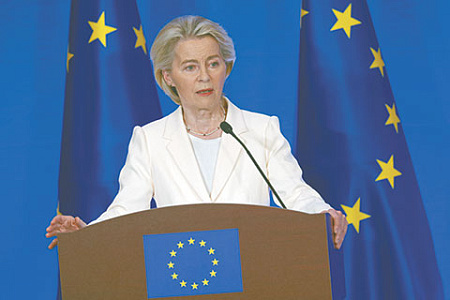
The European Union is preparing to impose its 19th package of sanctions against Russia, signaling an end to a brief pause in punitive measures. European Commission President Ursula von der Leyen announced the move, condemning recent Russian strikes on Kyiv that damaged the EU’s representative office. While the attack served as an immediate catalyst, the decision reflects a broader sentiment in Brussels that recent peace-making efforts led by U.S. President Donald Trump have failed to yield results.
Calling the strikes “outrageous,” von der Leyen confirmed that a “19th tough package” would be presented for approval shortly. She also emphasized ongoing “work on Russian assets to contribute to Ukraine’s defense and reconstruction.” This refers to the EU’s strategy of transferring profits from frozen Russian central bank assets to Ukraine, a policy adopted after forgoing direct confiscation due to fears of destabilizing European investment markets. An estimated €10 billion from these profits has already been allocated to Ukraine through August 2025.
This announcement strategically aligns with an informal meeting of EU defense and foreign ministers in Copenhagen, where the use of Russian asset proceeds to support Ukraine’s defense industry is a key topic. The meeting’s significance is highlighted by the presence of NATO Secretary General Mark Rutte and Ukrainian Defense Minister Denys Shmyhal. Their participation follows a recent joint visit to a Ukrainian drone facility, where discussions centered on securing Western financing to bolster Kyiv’s military-industrial complex.
The EU’s previous hiatus on sanctions was widely seen as a gesture of support for President Trump’s diplomatic initiative, which culminated in a meeting with Vladimir Putin on August 15. Subsequently, Trump outlined a peace process to European and Ukrainian leaders that hinged on a direct meeting between Presidents Zelenskyy and Putin. However, European allies have openly expressed doubts about the viability of such talks in the near future and are now moving to increase pressure on Moscow, even while exploring non-NATO security guarantees for Ukraine as suggested by Trump.
While details of the 19th package are not yet public, reports suggest it will focus on closing loopholes and enhancing enforcement rather than introducing new sectoral bans. To ensure swift adoption and avoid a potential Hungarian veto, sanctions on Russian energy are expected to be omitted. Instead, the package will likely target Russia’s so-called “shadow fleet” of oil tankers. This approach marks a clear divergence from the United States, where the Trump administration, despite its rhetoric, has not announced corresponding new sanctions and appears to maintain that the window for negotiation with Moscow remains open.
